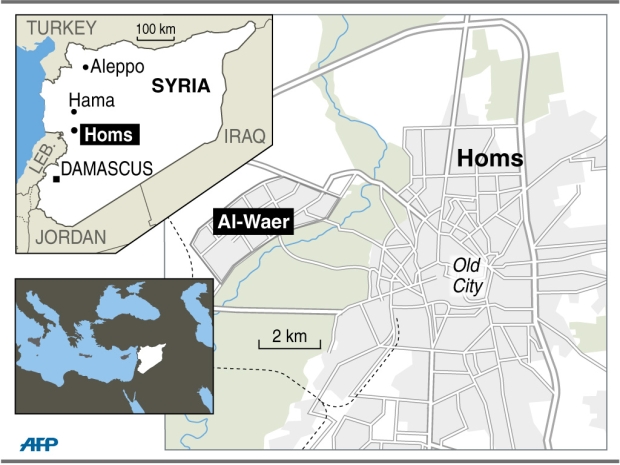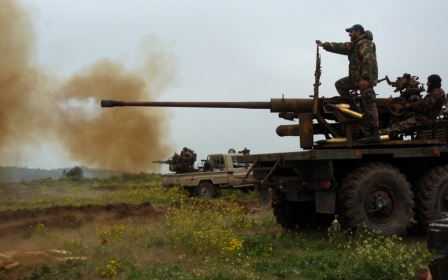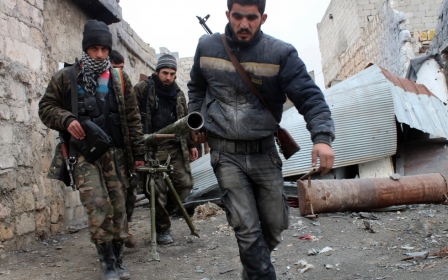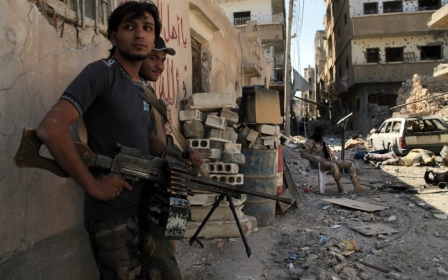Rebels to leave Syria's Homs in deal in 48 hours: governor
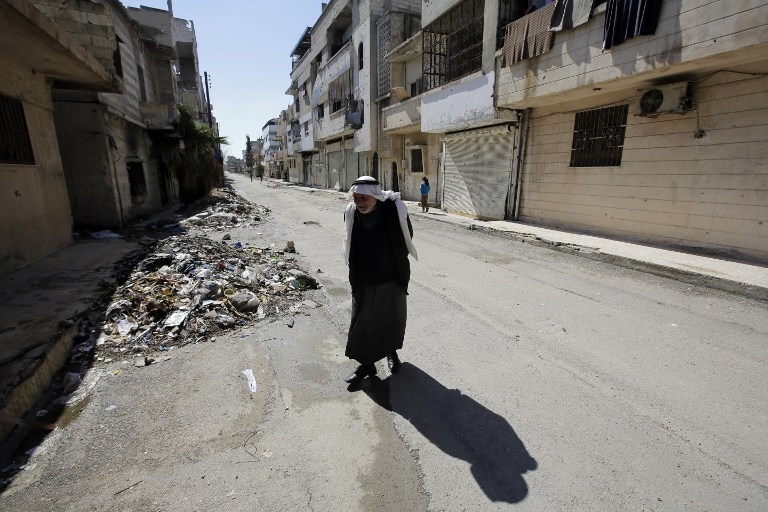
A deal between Syria's government and rebels for opposition fighters to leave the Old City of Homs will be implemented in the next 48 hours, the provincial governor said Monday.
"We will begin the application of the initiative in the coming 48 hours depending on the situation on the ground," Homs governor Talal al-Barazi told AFP.
"I hope that things will go smoothly, in which case the initiative will be completed quickly," he added.
The agreement involves the fate of about 2,250 fighters, civilians and injured people, according to the opposition.
They have been trapped in the neighbourhoods under government siege for nearly two years, and will be granted safe passage out under the accord.
New MEE newsletter: Jerusalem Dispatch
Sign up to get the latest insights and analysis on Israel-Palestine, alongside Turkey Unpacked and other MEE newsletters
"We have agreed that they will head towards Talbisseh and Dar al-Kabira," Barazi said, referring to two rebel districts in the north of Homs province.
The governor refused to describe the plan as a "deal" preferring to use the term "arrangement" instead and said various logistical issues had been tackled.
"An appropriate route, the people who will be present at the departure and arrival points to ensure the security of the convoy, the security points on the route and the removal of the mines placed by the rebels in the Old City," he said, referring to the challenges.
"We have to prepare properly because if this is successful, we will be able to continue in Waer," he said.
Waer will be the only remaining rebel area in Homs after the evacuation of the besieged Old City and surrounding areas.
Several hundred thousand people live there, including thousands displaced from other areas.
Rebel fighters have said that the deal involves the freeing of 70 Lebanese and Iranian prisoners being held by the rebel Islamic Front alliance in the northern province of Aleppo, as well as the entry of aid to two Shiite pro-regime villages under rebel siege in the same province.
Barazi denied the existence of Iranian hostages but said all initiatives between the rebels and government involved efforts to seek the release of hostages and the entry of humanitarian aid.
The deal brought together -- for the first time -- representatives of President Bashar al-Assad's security forces, the rebels and Damascus backer Iran.
Homs was dubbed the "capital of the revolution" at the start of the anti-Assad uprising in 2011, and it has seen some of the heaviest violence in Syria's war.
Also under the deal, a copy of which was obtained by AFP, relief will be allowed into two Shiite, pro-regime towns in the northern province of Aleppo that are under siege by rebels.
The text specifies that the evacuees will be escorted by UN and Iranian embassy representatives, as "guarantors" of their safety.
But regime representatives said it was an "arrangement" rather than a deal.
"There is no deal, there is an arrangement and reconciliations that should lead to the handing over of the city, stripped empty of weapons and of armed men," said Homs governor Talal al-Barazi.
"On the ground there is nothing yet," he said.
The main opposition National Coalition, for its part, issued a statement in praise of "the heroic actions of the revolutionaries" in Homs.
The group also called on the United Nations "to fulfil its duty and to ensure the regime honours the truce" which began on Friday.
An activist from Homs told AFP: "Today, the modus operandi of the withdrawal was put in place. But there will be fear from both sides until the exit takes place."
Army advance
The army made major advances Sunday on Mleiha, a town strategically located southeast of Damascus near the airport road, a security official said.
"More than half of the town is under army control," the official told AFP, on condition of anonymity.
The Syrian Observatory for Human Rights also reported the advance, saying that Lebanon's Shiite movement Hezbollah was playing a "lead role" in the battle.
Like the rest of the Eastern Ghouta area, Mleiha has been besieged for the past year and under fierce bombardment for several weeks.
The advance and agreed rebel pullout from Homs come a month ahead of a presidential election in which Assad is poised to return to power.
On Sunday, the constitutional court announced it had accepted the bids of two challengers for Assad's seat: Maher Abdel Hafiz Hajjar and Hassan Abdallah al-Nuri.
Neither contender is known to the Syrian public.
While the June 3 election will be the country's first multi-candidate vote, the rules effectively rule out any serious opponents to Assad's regime from running.
Among them is the stipulation that anyone who has lived outside Syria in the past decade is excluded, effectively barring most prominent opposition figures, who live in exile.
At the same time, the vote will only be held in areas under government control.
The election is being held amid a brutal civil war that has killed more than 150,000 people since March 2011 and made millions homeless.
In neighbouring Jordan on Sunday, the UN refugee agency rebuked donors for not doing enough to help the millions of Syrian refugees and the countries hosting them, saying the crisis demanded "massive support."
"This enormous impact is not being fully recognised by the international community," UN High Commissioner for Refugees Antonio Guterres said at a meeting of senior officials from Egypt, Jordan, Iraq, Lebanon and Turkey.
"Let me be very clear, there has been very little support," he said at the Zaatari refugee camp in northern Jordan, which is home to more than 100,000 Syrians.
In an interview with Al Arabiya, UN Secretary-General Ban Ki-moon told the television channel that the Syrian authorities are preventing aid from reaching millions of Syrians in need of it.
"It's not that we are in shortage of something to deliver, it's just because of bureaucratic resistance by the Syrian government," he said.
Operations in Syria kill 50, activists say
At least 50 people were killed across Syria on Sunday in air and ground operations allegedly carried out by forces loyal to Assad's regime, opposition activists claimed.
Twelve were killed in Aleppo; eight each in Hama, Daraa and in the suburbs of Damascus; six in Idlib, five in Homs; one each in Lattakia, Tartous and Deir-ez Zor; according to London-based Syrian Network for Human Rights.
Another group, the Syrian Revolution General Commission (SRGC), claimed several buildings including historic structures were damaged by a series of barrel bomb attacks conducted by regime helicopters in the opposition controlled areas in Aleppo.
Meanwhile, Syrian security forces "neutralized" a large number of armed groups during operations in Aleppo, Idlib and Daraa, said the Syrian government's official SANA news agency.
The ongoing three-year conflict in Syria has internally displaced more than 6.5 million people, according to the UN.
More than two million Syrians are now registered as refugees in neighboring countries, including Turkey, Lebanon, Jordan and Iraq.
Middle East Eye delivers independent and unrivalled coverage and analysis of the Middle East, North Africa and beyond. To learn more about republishing this content and the associated fees, please fill out this form. More about MEE can be found here.


